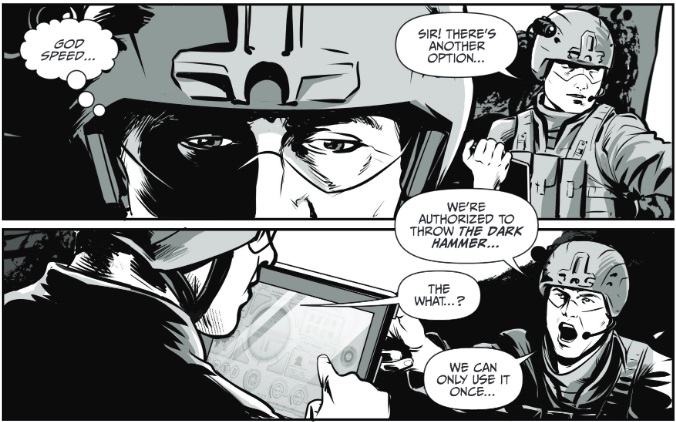
The “Dark Hammer,” it turns out, is a secret cyber attack capability that allows the U.S. troops to completely cripple North Korea’s communications, “turning their own artillery against themselves, and destroying their autonomous forces.”
The comic doesn’t address how North Korea’s autonomous forces have become such a looming threat in the next nine years, nor does it explain how decades old artillery assets could be “turned” against North Korea through a cyber attack, but comic books are allotted some leeway when it comes to realism.
Thanks to the capabilities allotted by U.S. Cyber Command, disaster is averted and the underdog United States lives to fight another day against the seemingly superior North Korean offensive.

So what’s at play in these comic books? They were clearly released with intent, but before an analysis of what that intent may be, it’s important to address our perceptions of loaded words like intent, manipulation, perception, and propaganda. In many contexts, each of those words carries a distinctly negative connotation. Russia’s intent was to manipulate the American people’s perceptions through propaganda. However, from the (seemingly cynical) perspective of people who study this sort of thing, nearly all content distributed through media of any sort has the intent of manipulating perceptions. Marketing is private sector propaganda, aimed at informing your purchases. Public relations is, again, private sector propaganda, aimed at managing your perceptions of companies or individuals. Even the dreaded “click bait” is a modern form of of the same influence… pushing you to click on a link, because clicks are the currency of the digital realm.
That’s a long way of saying, just because a piece of content has the intent to manipulate you, doesn’t make it inherently nefarious. It’s just the way of the world, for better or worse.
As discussed previously, effective propaganda is delivered in a layered approach, fulfilling the needs or accomplishing the objectives of multiple efforts as a means of not only plausible deniability, but to ensure the content is well received by an increasingly cynical audience in the era of “fake news” accusations and pervasive marketing. For propaganda to be effective, it’s got to be the cream filling, not the Oreo cookie exterior. With that in mind, three distinct perception management campaigns are evident in these two comic books released by the U.S. Army.
Recruitment
While one might think that two comic books that depict U.S. forces losing, or very nearly losing battles against enemies like Russia or North Korea wouldn’t serve as a powerful recruitment aid, many who have served might tell you differently. These comics depict American forces as the underdog in a fight not only for their lives, but to protect the people of South Korea and Romania against the ever-nefarious “other” – represented in these instances by foreign nations that are currently no more than diplomatic opponents of the United States.
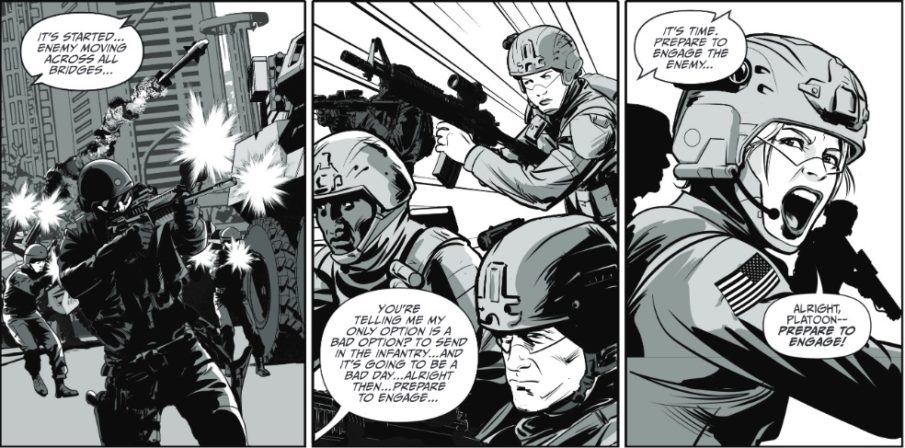
For many red-blooded Americans, these depictions of individual heroes (notably a female hero in one of the stories) willing to put their lives on the line to defend those in need is exactly the sort of thing they hope to do when signing on the dotted line. These stories advance the perception that serving in the American military is your chance to make a difference.
All materials produced by the Department of Defense for media consumption, it pays to remember, has some element of recruiting involved.
Managing Perceptions of American Opponents
The U.S. Army usually doesn’t identify the names of the nations they’re training to only potentially fight. That’s why fictional nations like Atropia are invented – to ensure the Army’s training doesn’t have a negative effect on international relations… it’s hard to enter into high level talks with a nation like Russia intended to diffuse tensions, while simultaneously conducting “Operation Get Ready to Invade Moscow” at Fort Benning. As such, real potential opponents’ names are often left out of hypothetical conflicts… but that’s not the case in Cyber Command’s “Threatcasting” comics.

By directly identifying Russia and North Korea as the aggressors in both instances, these comics are making intentional choices about how the reader perceives them. Both comics open by providing some character development to their U.S. troops, either through banter or flashbacks to the all-American childhoods, playing football in the backyard. The enemy forces, on the other hand, remain completely faceless throughout, and with good reason. Just like the Stormtroopers in Star Wars, the Borg in Star Trek, zombies in the Walking Dead and the ninja Foot Clan in Teenage Mutant Ninja Turtles, robbing an opponent of their individuality, of their identity, also robs them of their humanity. We can hack at zombies and blast away at Stormtroopers because they aren’t people to us. They’re the nameless, faceless them we all fear.
Showing the aggression of these foreign states, but not their faces or stories, is a narrative decision that gives us, the reader, a clear protagonist to root for – but because they represent real nations made up of real people, these depictions can also skew the way we see these populations, and in turn, the possibility of conflict with them. Note, this isn’t a criticism of the narrative, but rather an observation about the choices made in the depiction of the characters.
Internal Posturing
While the first two underlying perception management efforts depicted in these comics may be fairly easy to glean, the third requires a bit of an “insider baseball” approach. The U.S. Army’s Cyber Command is an entirely new endeavor, first established only eight years ago and rapidly expanding to address the growing challenge presented in warfare’s digital theater. Because of its relative youth compared to more well established command structures within the U.S. military, and the unprecedented nature of the challenges it faces, there is no established procedure for Cyber’s growth.
Cyber Command’s leadership, as a result, have been jockeying to absorb more authority over elements of the U.S. Defense infrastructure that tie into elements of their purview. One of these elements is on full display in the “Silent Ruin” comic, where it’s Russia’s ability to neutralize U.S. drones with a cyber attack that gives them the advantage. The underlying premise being, without Cyber Command’s oversight, American drones are vulnerable.

Likewise in “Dark Hammer,” it’s Cyber Command’s development of a digital weapon that even senior ranking officers seem only passively aware of that wins the day.
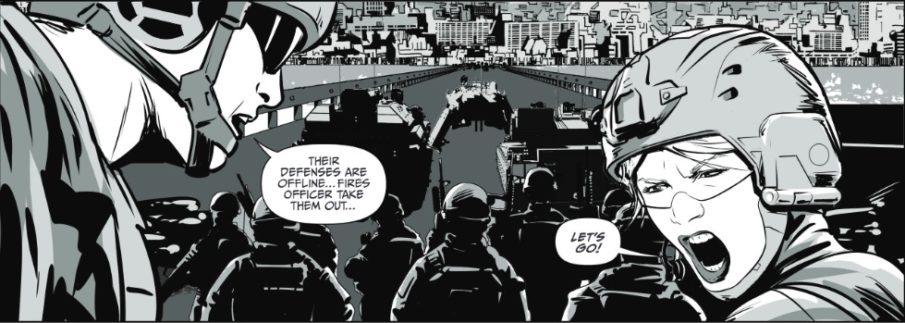
In both instances, it’s the U.S. Cyber Command’s autonomy, and inferred budget, that holds the key to American victory.
“Every unit is competing for their piece of the budget,” Salil Puri explained, “And Cyber has a history of trying to expand their domain.”
You can read the U.S. Army Cyber Command’s Threatcasting comics in their entirety at the links below:
Images courtesy of the U.S. Army Cyber Command

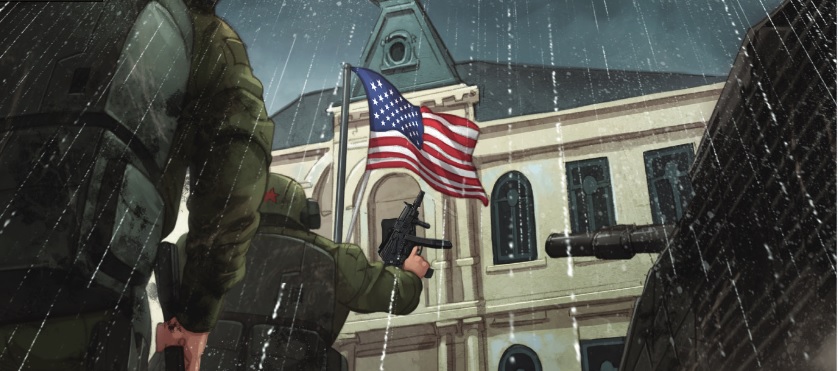
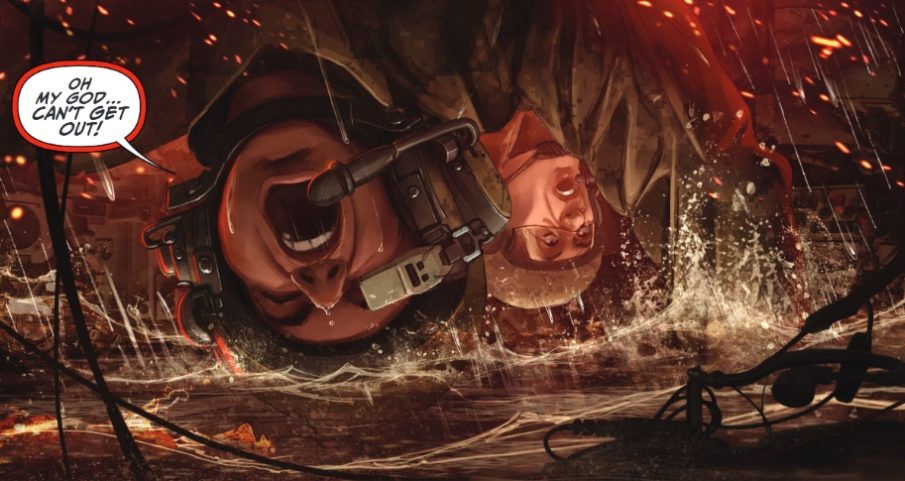
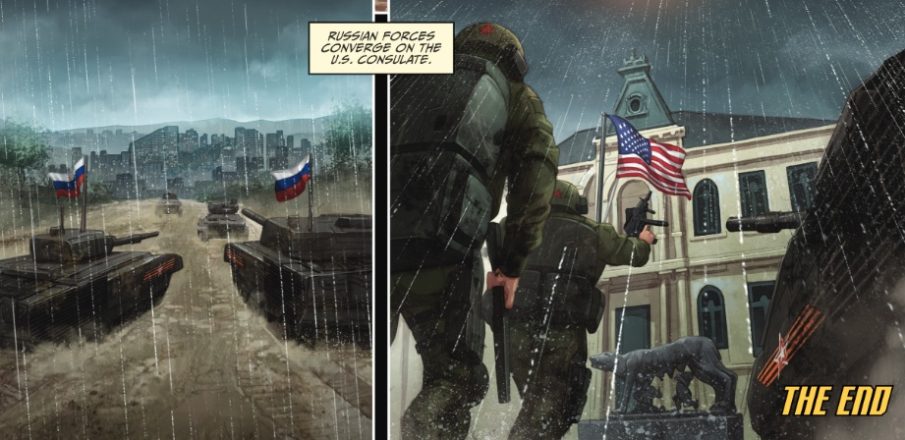
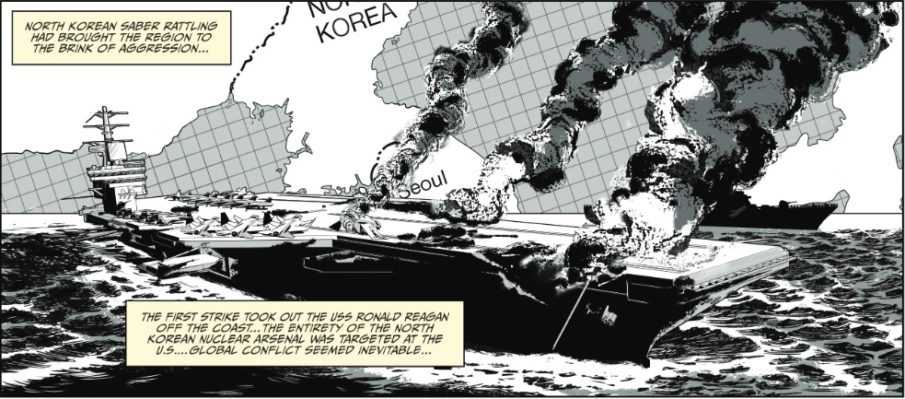








COMMENTS